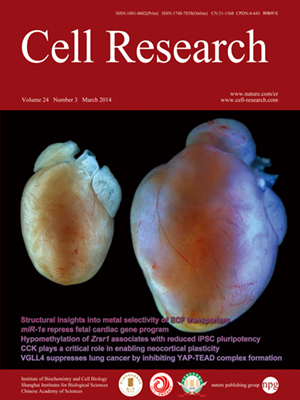
Volume 24, No 3, Mar 2014
ISSN: 1001-0602
EISSN: 1748-7838 2018
impact factor 17.848*
(Clarivate Analytics, 2019)
Volume 24 Issue 3, March 2014: 307-330 | Open Access
ORIGINAL ARTICLES
Cholecystokinin from the entorhinal cortex enables neural plasticity in the auditory cortex
Xiao Li1,2,3,*, Kai Yu2,6,*, Zicong Zhang1,2, Wenjian Sun1,2, Zhou Yang2,7, Jingyu Feng1,2, Xi Chen1,2, Chun-Hua Liu4,5, Haitao Wang4,5, Yi Ping Guo4,5 and Jufang He1,2,3,4,5
1Department of Biology and Chemistry, City University of Hong Kong, Tat Chee Avenue, Kowloon, Hong Kong SAR, China
2Department of Rehabilitation Sciences, The Hong Kong Polytechnic University, Hung Hom, Kowloon, Hong Kong
3University of Chinese Academy of Sciences (CAS) and CAS-Hong Kong Joint Laboratory, Institute of Biophysics, Beijing 100101, China
4Key Laboratory of Regenerative Biology, Guangzhou Institute of Biomedicine and Health, Chinese Academy of Sciences, Guangzhou, Guangdong 510530, China
5Guangdong Provincial Key Laboratory of Stem Cell and Regenerative Medicine, Guangzhou, Guangdong 510530, China
6Cold Spring Harbor Laboratory, 1 Bungtown Road, Cold Spring Harbor, NY 11724, USA
7Division of Life Science, Hong Kong University of Science and Technology, Clearwater Bay, N.T., Hong Kong SAR, China
Correspondence: Jufang He, Tel: +852-34427042; Fax: +852-34420522(jufanghe@cityu.edu.hk)
Patients with damage to the medial temporal lobe show deficits in forming new declarative memories but can still recall older memories, suggesting that the medial temporal lobe is necessary for encoding memories in the neocortex. Here, we found that cortical projection neurons in the perirhinal and entorhinal cortices were mostly immunopositive for cholecystokinin (CCK). Local infusion of CCK in the auditory cortex of anesthetized rats induced plastic changes that enabled cortical neurons to potentiate their responses or to start responding to an auditory stimulus that was paired with a tone that robustly triggered action potentials. CCK infusion also enabled auditory neurons to start responding to a light stimulus that was paired with a noise burst. In vivo intracellular recordings in the auditory cortex showed that synaptic strength was potentiated after two pairings of presynaptic and postsynaptic activity in the presence of CCK. Infusion of a CCKB antagonist in the auditory cortex prevented the formation of a visuo-auditory association in awake rats. Finally, activation of the entorhinal cortex potentiated neuronal responses in the auditory cortex, which was suppressed by infusion of a CCKB antagonist. Together, these findings suggest that the medial temporal lobe influences neocortical plasticity via CCK-positive cortical projection neurons in the entorhinal cortex.
10.1038/cr.2013.164
FULL TEXT | PDF
Browse 2441


